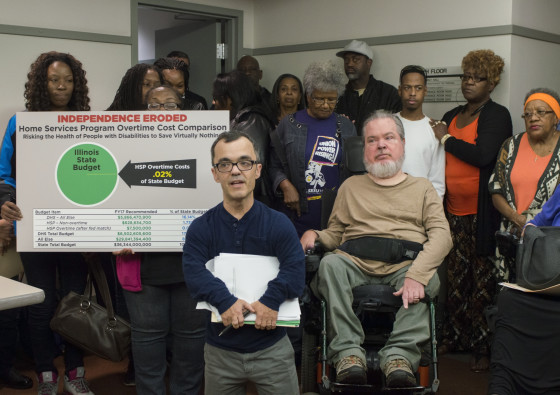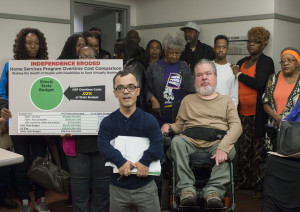Advocates and Workers unite against disastrous overtime cuts that threaten independence and supports of people with disabilities

 CHICAGO– On October 3, scores of people with disabilities, workers from the Illinois Home Services Program, and allies and advocates spoke out against proposed rules that jeopardize people with disabilities and personal assistants in the Home Services Program. Consumers and workers in the program, as well as leaders from Access Living, Chicago ADAPT, and Equip for Equality, among others, all testified against the proposed rules at a public hearing called by The Illinois Department of Human Services. “We believe that the Illinois overtime are unworkable as written and will cause significant harm, including the unnecessary institutionalization of individuals with disabilities,” said Adam Ballard, Access Living Manager of Community Organizing.
CHICAGO– On October 3, scores of people with disabilities, workers from the Illinois Home Services Program, and allies and advocates spoke out against proposed rules that jeopardize people with disabilities and personal assistants in the Home Services Program. Consumers and workers in the program, as well as leaders from Access Living, Chicago ADAPT, and Equip for Equality, among others, all testified against the proposed rules at a public hearing called by The Illinois Department of Human Services. “We believe that the Illinois overtime are unworkable as written and will cause significant harm, including the unnecessary institutionalization of individuals with disabilities,” said Adam Ballard, Access Living Manager of Community Organizing.
Illinois’ proposed overtime restrictions were originally implemented in May of 2016. Except under very rare exceptions, the rules cap the number of hours a personal assistant may work per week at 40, and forbid any personal assistant from working more than 35 hours per week for one consumer. Under the rules, if a personal assistant works overtime without approval, or infringes upon the restrictions in any way, they will receive an “occurrence.” Any personal assistant who receives three occurrences is subject to termination. In the first pay period after the rules were implemented in May, Illinois issued more than 2000 occurrences. Elaine Walker is a personal assistant in the program who works for her two daughters. Both her daughters have cerebral palsy. In May, she was told by the State would be terminated if she worked overtime three times and submitted time sheets. Because of the threats, rather than hire a stranger to cover the additional hours, Walker continued working more than 40 hours a week but did not submit requests for overtime. “I didn’t feel that I had any other choice,” Walker said. “My daughters needed the services I was providing, and if the State were to terminate me they would have nowhere to turn.”
In August, in the face of backlash from people with disabilities and workers, and under threat of litigation, Illinois rescinded the overtime restrictions. Rather than engage with the disability and labor community to collaborate on new guidelines, Illinois resubmitted the overtime restrictions through the administrative rules process. Illinois’ proposed overtime restrictions will be taken up the Illinois Joint Committee on Administrative Rules (JCAR). The proposal submitted to JCAR is actually worse than the originally proposal. The new proposal removes “Consumer Control,” a key principle of the Home Services Program that gives people with disabilities the independence to hire, fire, and manage their personal assistants. While removing consumer control, the new proposal adds the phrase, “If the customer is determined to be able to manage an Individual Provider . . .” which takes autonomy from the consumer and puts control into the hands of Illinois.
In preparation for the overtime restrictions, Illinois claimed to have saturated the personal assistant pool with qualified workers. For people like Sharon Lamp, that was not the case. Lamp is a person with a disability in the Home Services Program. Lamp receives 54 hours of service a week under her plan. Lamp cut the hours of her personal assistant in order to comply with the Illinois overtime restrictions. After an extensive search, Lamp was unable to find additional personal assistants to cover the gaps in her service plan, which forced her to miss work and repeatedly disrupted her academic schedule. “At no other time in my years of participation in the program, have I received reduced services or had my service needs unmet,” said Lamp. “On several occasions, my worker provided additional hours rather than leave my basic care unattended to. In these cases, even though DHS was fully aware that that I was not otherwise receiving the service needed, DHS stated that my worker could not report those hours of work, without risk of termination.”
There was an estimated need for consumers to hire 8,847 additional personal assistants to comply with the overtime restrictions. But the latest data only showed an increase of just 2,700. “Falsely, the Rauner administration has claimed that they were able to find personal assistants to cover the overtime hours for which people with disabilities qualified,” said Terri Harkin, Vice President of the Home Health Care Division at SEIU Healthcare. “That is not the case. It appears the administration was almost 6,100 providers short in June.”
Illinois continues to defend the overtime restrictions, claiming the policy will save the State money. Yet, the cost savings come at the expense of people like Elaine Walker and her family, and Sharon Lamp. Also, if Illinois refuses to collaborate with stakeholders, the policy will backfire, forcing people with disabilities into nursing homes, which cost thousands of dollars more per person each year compared to the Home Services Program.
###
Watch caregiver Giselle Wallace testify that the Governor’s overtime policy caused the death of her consumer
